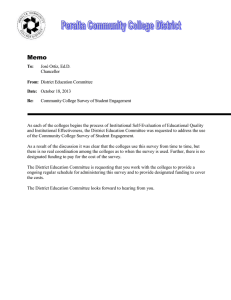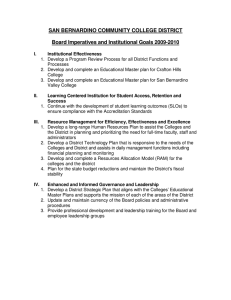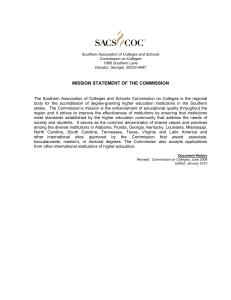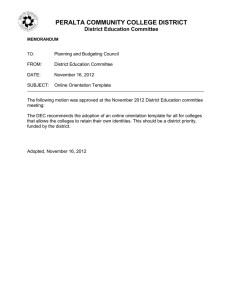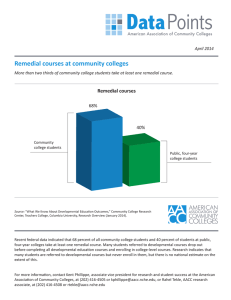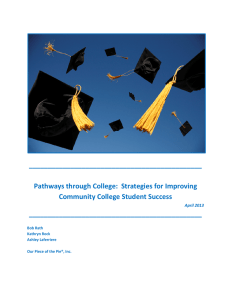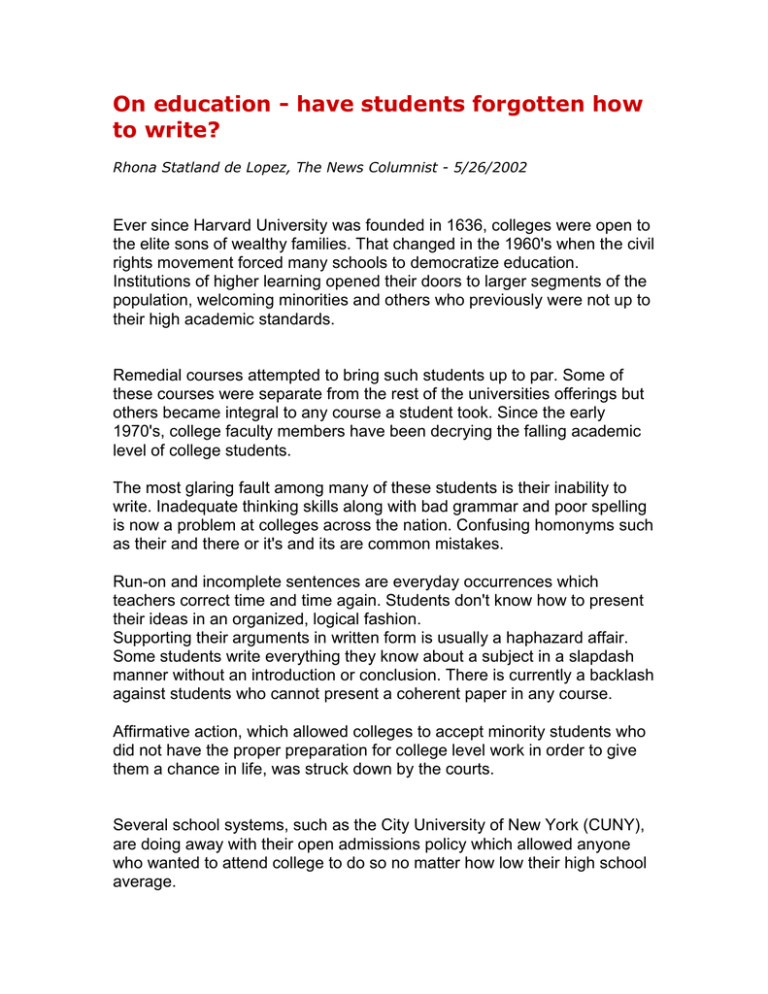
On education - have students forgotten how
to write?
Rhona Statland de Lopez, The News Columnist - 5/26/2002
Ever since Harvard University was founded in 1636, colleges were open to
the elite sons of wealthy families. That changed in the 1960's when the civil
rights movement forced many schools to democratize education.
Institutions of higher learning opened their doors to larger segments of the
population, welcoming minorities and others who previously were not up to
their high academic standards.
Remedial courses attempted to bring such students up to par. Some of
these courses were separate from the rest of the universities offerings but
others became integral to any course a student took. Since the early
1970's, college faculty members have been decrying the falling academic
level of college students.
The most glaring fault among many of these students is their inability to
write. Inadequate thinking skills along with bad grammar and poor spelling
is now a problem at colleges across the nation. Confusing homonyms such
as their and there or it's and its are common mistakes.
Run-on and incomplete sentences are everyday occurrences which
teachers correct time and time again. Students don't know how to present
their ideas in an organized, logical fashion.
Supporting their arguments in written form is usually a haphazard affair.
Some students write everything they know about a subject in a slapdash
manner without an introduction or conclusion. There is currently a backlash
against students who cannot present a coherent paper in any course.
Affirmative action, which allowed colleges to accept minority students who
did not have the proper preparation for college level work in order to give
them a chance in life, was struck down by the courts.
Several school systems, such as the City University of New York (CUNY),
are doing away with their open admissions policy which allowed anyone
who wanted to attend college to do so no matter how low their high school
average.
Yet, the problem still continues. The controversy over whether teachers
should divert valuable class time to teaching logical thinking and cogent
writing rather than the subject matter at hand is in full force.
There are professors who believe that thinking and writing skills must be
taught long before students enter college. They say that those students
who are at the appropriate level lose out if teachers have to take time away
from the topic being taught to explain the basics of a good paper.
They hold fast to the idea of dedicating their classes to the serious
examination of issues in their field instead of dwelling on the importance of
proper writing.
Others accept the fact that their students need help. They work with them,
accepting the fact that they must deal with the students they have instead
of teaching to an ideal they would like to have.
Even the best colleges insist that students know how to write well. Harvard
hires preceptors in expository writing to help students hone their writing
skills.
At the other end of the spectrum, there are community colleges where
remedial courses in developmental writing are offered to students. There
they are taught the fundamentals they must know.
Some students take these courses three or four times before they pass or
simply drop out in frustration.
There are questions about students who are admitted to college but have
never learned to write properly. Is it because they have had poor teachers
throughout their school career or is it because they have neglected to put
into practice what has been repeated to them year after year?
Is it because few students read books on a regular basis outside
classroom assignments that they don't understand the elements of good
writing?
Or is it, as some have suggested, because students are living in a postliterate computer age where careful and thoughtful prose is pass??
Articles abound written by college teachers venting their frustration about
their task. Harpers Magazine ran an article last year entitled English 99:
Literacy among the ruins by Frank Gannon.
The author describes his experience at a nameless small college which
offered a preliminary writing course to those who would be overly
challenged by English 101.
He is confronted with students whom he divides into three categories: The
Bored-Looking Girls, The Jocks and The Refugees.
While it is perhaps easier to dismiss poor writing from the first two, it
becomes extremely difficult to reconcile the Bosnians' forceful content with
their broken English.
Gannon quotes from one of the students' papers. My sister had friend. She
said the soldiers took her off the street and hurt her and then let her go.
Then she cries never would come out of room. People say forget. That is
hard for her. She stay in room.
It is hard for a teacher to edit the English in this composition because the
corrections would somehow demean the content.
In the end, Gannon says, "I remember circling the verb and writing
agreement."
While it is easy to complain about students who write poorly because they
don't care, it is harder to know how to deal with students who try hard but
don't make the grade.
Some work diligently revising their compositions and correcting their
errors. Yet, when a new topic is assigned, the very same kinds of mistakes
they made in the first writing appear in the next.
Many teachers feel sorry for such students and pass them when they
shouldn't. They are slowly contributing to the degradation of the college
degree. The solution to the problem of college students who have no
business being in college is still being sought.
© Copyright 2002 TheNewsMexico.com All Rights reserved.

